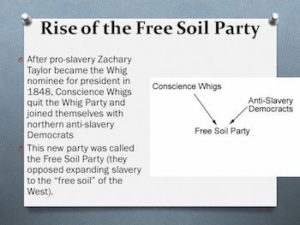
This date in 1848 celebrates the Free-Soil Party, a small but influential political party in American history before the American Civil War.
The party was opposed to the extension of slavery into the western territories. Representative David Wilmot of Pennsylvania in 1846 introduced his famous Wilmot Proviso into Congress, calling for the prohibition of slavery in the vast, southwestern lands newly acquired from Mexico.
The Wilmot concept failed in Congress and was a direct ideological forerunner to the Free-Soil Party. Disappointed by the Whig Party's hesitant position toward slavery, "Conscience" Whigs held a convention in August 1848 at Buffalo, N.Y. They were joined by delegates from 17 states drawn from the Liberty Party and the antislavery faction of the New York Democrats, known as "Barnburners."
The Free-Soilers' historic slogan calling for "free soil, free speech, free labor, and free men" attracted small farmers, debtors, village merchants, and household and mill workers, who resented the prospect of Black-labor competition, whether slave or accessible in the territories.
In 1848, the Free-Soil Party nominated former U.S. President Martin Van Buren to head its ticket. Though the party polled little of the popular vote in the presidential election that year, it weakened the regular Democratic candidate in New York. It contributed to the election of the Whig candidate, General Zachary Taylor, as president. The Free-Soil vote was reduced to 5 percent in 1852 when John P. Hale was the presidential nominee.
Nevertheless, a dozen Free-Soil congressmen later held the balance of power in the House of Representatives, thus wielding considerable influence. In addition, the party was well-represented in several state legislatures. In 1854, the disorganized remnants of the party were integrated into the newly formed Republican Party, which carried the Free-Soil idea of opposing the expansion of slavery.